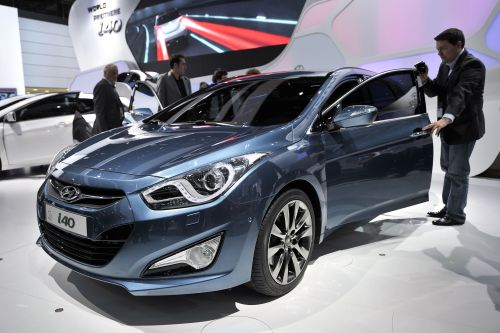Korea’s No. 1 carmaker launches i40 D-class vehicle at Geneva auto show
GENEVA (AP) ― Fast-growing Hyundai may be best known for its small cars, but plans to break into the premium market with a new sedan has the big guys looking over their shoulders.
The Korean automaker is not half as well known in Europe as Toyota, for example, and consumers typically associate its cars with affordability rather than luxury desirability. And yet the company has swerved into the fast lane ― its sales in Europe have grown far faster than the broader market, unnerving locals, and it is gaining rapidly in the United States.
Volkswagen’s chairman, whose goal is to make the German automaker the biggest in the world, says Hyundai is the one company that could foil his ambitions.
“I think it’s very flattering,’’ Allan Rushforth, chief of Hyundai Motor Europe, said in an interview Wednesday on the sidelines of the Geneva Auto Show. But he said the company is not focused on its place in the global auto industry landscape.
Rather, Hyundai is concerned with broadening its appeal, making itself better-known, and selling bigger cars at improved margins.
The launch of the i40 D-class vehicle at the Geneva show marks Hyundai’s entry into the accessible luxury segment, where it wants to compete with the Toyota Aventis.
At the Hyundai stand, competitors and admirers alike were peering into a sleek, blue station wagon version on display. The car, which boasts such features as heated and reclining seats, heated steering wheel and an active demisting system, will go on sale over the summer, followed by a sedan toward the end of the year.
 |
A visitor takes a close look at a Hyundai i40 unveiled at the carmaker’s booth at the Geneva motor show. (AFP-Yonhap News) |
Hyundai’s goal is to sell 60,000 of these new models in 2012, which would make it one of the top six cars in its class. It is similar to the Sonata in the United States and may be rolled out into other markets in the future, said Rushforth.
Arrigo Pozzi, a sales manager for Switzerland’s Blick newspaper, said he’s not a car guy, but he was drawn to the station wagon by its style and was surprised when he saw it was a Hyundai.
“Their autos until now were somewhat ugly. But now they have a nice design. I think they have a good chance,’’ Pozzi said.
And yet Rushforth claims his company is not focused on its size.
“We don’t want to become the biggest. There are inevitable growing pains as we do get larger, around capacity,’’ Rushforth said.
Hyundai posted a 4.7 increase in registrations in 2010 in Europe ― to more than 358,000 vehicles. That’s in stark contrast with a market that shrank nearly 5. It is also racing ahead in the United States, where it has a plant in Alabama. U.S. sales volume last year increased 24 percent last year from 2009 to 538,000 units.
The automaker sold 3.6 million vehicles globally last year, compared with Toyota’s 7 million.
A competitor at a Japanese brand, who declined to give his name, said Korean automakers were occupying the entry luxury class that Japan once dominated ― and competing really well. He predicted the i40 would be a success.’’
“I think it is really a great car,’’ he said, “competitive for the city segment.’’
Unlike other makers of small cars that benefited from incentives by European governments last year, Hyundai’s market share did not shrink last year. Rather it grew from 2.4 percent in 2009 to 2.6 percent last year. Hyundai is targeting 3 percent share in 2011.
Rushforth credits Hyundai’s increasing brand awareness in Europe, but acknowledges it is often misunderstood, at least in Europe.
According to one estimate, Hyundai’s brand awareness in Europe is around 20 percent ― half that of Toyota. Gaining consumers’
awareness is crucial to help sales ― and if the sales are at the accessible luxury level, that means higher margins in a tight European market where makers of lower cost cars have a hard time making money.
“We are profitable’’ in Europe,’’ Rushforth said. “It’s a challenging market to make money. That is one of the reasons we are launching the i40’’ to squeeze better profits.
Some European automakers have complained about Korea’s free trade agreement with the European Union, saying the deal will give Hyundai access to Europe that won’t be entirely reciprocal because of Korea’s ability to manipulate its currency, which helps its exports.
Korean automakers will begin reaping benefits next year.
But Rushforth said that view misses the fact that 80 percent of Hyundai cars sold in Europe are made outside of Korea, and that 50 percent are made in Europe. Hyundai is about to raise capacity at its Czech Republic plant to 300,000 a year from 200,000, adding a third shift and hiring 1,000 new workers.
“The potential benefits are less than competitors may imagine,’’ Rushforth said of the free trade agreement.







![[Today’s K-pop] Blackpink’s Jennie, Lisa invited to Coachella as solo acts](http://res.heraldm.com/phpwas/restmb_idxmake.php?idx=644&simg=/content/image/2024/11/21/20241121050099_0.jpg)
